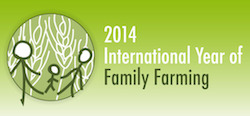 In celebration of the United Nations’ 2014 International Year of Family Farming, this month National Farmers Union (NFU) is highlighting the importance of family farmers and local communities, as well as some of the tools available to help family farmers increase their economic footprint and clout. A great deal of emphasis is placed this month on cooperatives and farm to school efforts, as October is also both Farm to School Month and Cooperative Month.
In celebration of the United Nations’ 2014 International Year of Family Farming, this month National Farmers Union (NFU) is highlighting the importance of family farmers and local communities, as well as some of the tools available to help family farmers increase their economic footprint and clout. A great deal of emphasis is placed this month on cooperatives and farm to school efforts, as October is also both Farm to School Month and Cooperative Month.
“Family farmers are the engines that drive rural America, pumping millions of dollars into local communities as they purchase the inputs they need for their farms,” said NFU President Roger Johnson.
Johnson noted that as a result, farm output continues to rise, with market values of crops, livestock and agriculture products reaching record highs in 2012. According to the recent Census of Agriculture, 87 percent of U.S. farms are owned by families or individuals, and in 2012, there were 2.1 million farms in the U.S, with an average farm size of 418 acres. But according to that same census, those numbers of farms are falling, down more than four percent from 2007, while the average farm size has continued to grow.
“Clearly, NFU has a role to play in ensuring that family farmers remain competitive and productive in the ever-changing and increasingly competitive environment they operate in.” Johnson explained that one of the best tools available to family farmers to pool their resources and multiply both their buying and selling powers is through their involvement in farm cooperatives.
“Farm cooperatives have been a major Farmers Union push for decades, because they provide education and training for members, elected representatives, managers and employees who can then go on to contribute effectively to the development of their cooperatives and their communities,” Johnson said.
But we must also push to open up new markets for family farmers. With the increased emphasis on eating local and knowing more about the farmer who produced the food you are consuming, consumers are increasingly seeking tools to educate students about the food industry.
NFU’s continued support for farmer to consumer outreach, and programs like the National Farm To School Network enriches the connection communities have with fresh, healthy food and local food producers by changing food purchasing and education practices at schools and preschools.
“By cementing the connection between consumers and farmers, we not only allow consumers to have increased confidence about the health of their food supply, but also build potential political allies so that when issues of importance to family farmers arise, consumers are ready to lend their support,” said Johnson.
